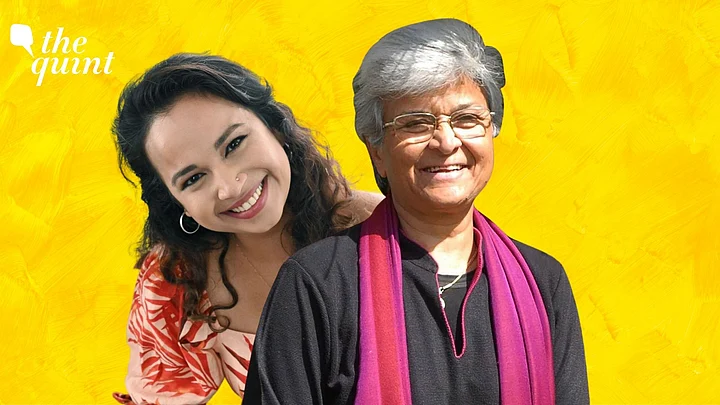Even before I could read, my favourite book was Kamla Bhasin’s Ulti Sulti Meeto.
It was about a girl who was naughty and playful. The illustrations in that book were so beautiful that I did not need words to understand it. The book eventually helped me accept my quirks from a very young age.
Meeto – the protagonist – would do things that were considered to be done by boys; she would play ‘boy games’, and just go around engaging in different activities – carefree and gender neutral.
It was much later when I realised Meeto was Kamla's daughter. Today, I understand how revolutionary that idea was for its time.
Her book Ghar Ka Kaam Hai Sabka Kaam (Housework Is Everyone's Job) set the tone for me as a woman. I never looked at my mother having to fulfil domestic responsibilities.
I expected the same responsibility from my father and even myself. The six-year-old me would help in the housework by doing my favorite work of ’jhadu'.
Just like Kamla’s poems taught me, I too chose an unconventional road.
I chose to make films. And since I wanted to pay a tribute to her, I wanted to make a film on her. To my surprise, there was no film or any video material on her back in 2012. I remember being overjoyed when she agreed.
Till date, my film is the only one that gives a rare glimpse into the feminist-activist's life.
I also made Kamla recite several lines of her poetry for the film. But my favourite remains the same:
Ki hawaon si hoti hain ladkiyan, Unhe behne me maza aata hai, Unhe manzoor nahi unhe bewajah roka jane.
(Girls are becoming like the wind,
They delight in frolicking freely ,
They cannot accept being stopped for no reason.)
Working with her was such a joy: she was down to earth, simple, and warm to my team and me. She was not afraid to be vulnerable and walked us through her life so openly.
I remember how sad everyone was on the last day of filming as we had such a beautiful time and no one wanted it to come to an end.
A Woman Who 'Did Not Obey'
Kamla Bhasin was a woman who 'did not obey'.
Today, she is known for her courage, and her enormous contribution to the women’s movement and women's history in India. She has created history with her work in South Asia, and the love she received wherever she went was a testament of that. She is an inspiration for so many women of her generation and more.
I want to tell more such stories through my work. Those stories of resilience and hope, the mighty women's movement of the 1980s, so we can honour women like Kamla and their legacies, and pay our tribute to them for the liberties and freedom we enjoy today as women of the 21st century.
A Favourite in Any Crowd
Kamla’s strength lay in her communication: she could talk to and connect with anyone, from any background. This skill made her unique and she would quickly become a favourite in any crowd.
She had immense energy and almost never stopped working.
She would often be seen multitasking. She would start her day with yoga, drive her red electric car to Sangat South Asian Organization for Women, which she had founded. On some days, while we were filming her, we would find TV news channel crew to interview her. All this, while she was deeply affected by her daughter Meeto’s passing and was worried for her son Chotu, who is on the spectrum.
While Kamla’s political life is well known, very few know her personal journey and sacrifices. My film was an attempt to make the world take a peek into her personal life along with her politics.
Her life inspired many women like me to break barriers, and I felt encouraged to establish my own legacy in the film, TV and advertising industries. She helped reveal my true purpose – to empower and support women through my work.
Not only does my production team always have women in majority, we also go out of our way to employ female talent and crew. I use my success to empower women and mentor young filmmakers not only in India but worldwide.
Currently, I am producing films globally; I feel strong enough to carve my own niche and produce films that are a reflection of women and their experiences.
Kamla Bhasin’s words and her journey are etched in my memory. Someday, I would love to produce a full-length documentary or a feature film on her.
(Kajri Akhtar is a Los Angeles-based film-maker. This is an opinion piece and the views expressed are the author's own. The Quint neither endorses nor is responsible for them.)
(At The Quint, we question everything. Play an active role in shaping our journalism by becoming a member today.)
